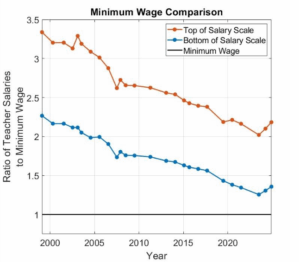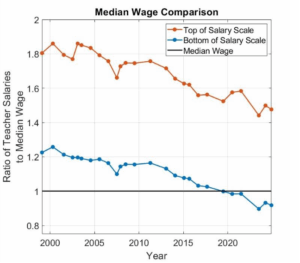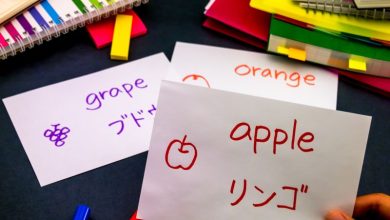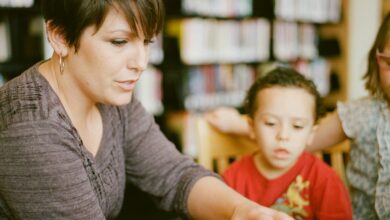Teacher salaries have plummeted relative to minimum and median wages
EXCLUSIVE: Teachers used to be paid two to three times more than minimum wage workers, finds maths researcher Leighton Watson.

Salaries for teachers have significantly decreased relative to minimum and median wage earners in New Zealand over the past 25 years.
In 1999, salaries for secondary school teachers ranged from $33,000 for a trained teacher with a three-year degree or equivalent, up to $48,600 at the top of the base salary scale. Since then, salaries have increased by approximately 200% to $64,083 and $103,086.
Read the latest print edition of School News online HERE.
During this same time, however, the minimum wage has increased from $7 per hour to $22.7 per hour, which is an increase of over 300%. This means that teaching salaries have plummeted relative to the minimum wage. In 1999, a classroom teacher made between 2.27 times and 3.34 times the minimum wage. In 2025, this has decreased to 1.36 times to 2.18 times the minimum wage.

Factoring in the cost of training at a university, it takes teachers over a decade since starting study to make more than a minimum wage worker over the same period. Teaching qualifications typically take three-years to complete, during which trainee teachers are paying university fees of around $6700 each year, and doing unpaid placements for eight weeks each year. This places undue financial pressure for teachers, as I showed in my previous paper with Bex Howell.
Teaching salaries have also dropped relative to the median wage. This is defined as the wage at which 50 percent of the country’s population make more, and 50 percent make less income. In 1999, secondary teachers made between 1.22 times the median wage at the bottom of the trained teacher salary scale, and 1.80 times median wage at the top of the scale. This has dropped to 0.92 times to 1.48 times in 2024.
If teaching salaries had remained the same relative to minimum wage, then teachers would be paid between $107,014 and $157,603 – an increase between $42,931 and $54,517 compared to current salaries. To keep up with average wage inflation since 1999, salaries would need to increase by around $22,000 to $85,558 for the base of the salary scale and $126,003 at the top of the scale.
Related School News story: New study finds teachers face excessive financial strain from unpaid placement.
This is in contrast with the government’s latest offer of salary increases between roughly one to five thousand dollars over two years, which falls well short of the tens of thousands of dollars needed to make up for the consistent erosion of teaching salaries over the past two decades.

While salaries have decreased relative to both minimum and median wages, teaching responsibilities and workloads have increased, with teachers increasingly struggling with behavioural issues, students unequipped to learn, and classroom management.
Given my findings, I believe the decrease in salaries relative to average wages may be a contributing factor to the teacher shortages, as it is becoming increasingly financially unattractive to work as a teacher.

Dr Leighton Watson is a senior lecturer of Mathematics and Statistics at the University of Canterbury. He is interested in modelling social and economic issues. Dr Watson wrote this article for School News.









